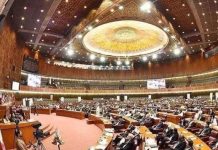Anjum Nisar urges govt to rethink Tax Laws to protect business growth
ISLAMABAD, May 11, 2025 — The Businessmen Panel (BMP) of the Federation of Pakistan Chambers of Commerce and Industry (FPCCI) has raised significant concerns about the recently implemented Tax Laws (Amendment) Ordinance 2025.
FPCCI’s Businessmen Panel Chairman Mian Anjum Nisar observed that the ordinance could severely harm the country’s investment climate, which is already under pressure due to various economic challenges. He further warned that if not reconsidered, these tax measures may discourage both domestic and foreign investors from engaging with Pakistan’s economy, thus hindering growth.
Anjum Nisar expressed disappointment that the new tax laws, while aimed at increasing government revenue, could backfire by creating unnecessary complexities in the business environment. “The tax laws are intended to increase compliance and improve revenue, but they bring with them a set of challenges that may, in fact, make it harder for businesses to operate efficiently,” Nisar said. He emphasized that businesses already face multiple hurdles, including rising costs and an unpredictable economic environment, and the new tax regime could add additional layers of burden on businesses.
“The government needs to understand that businesses are the backbone of the economy. They are the ones who create jobs, drive innovation, and generate the taxes that support government functions,” he said. “Unfortunately, this new ordinance adds layers of complexity that may make it more difficult for businesses, especially small and medium-sized enterprises (SMEs), to thrive.”
The FPCCI former Chairman highlighted that while Pakistan’s economy is struggling to recover from previous setbacks, the business community must be supported, not further burdened. He stated that the law, as it stands, does not provide the needed incentives for businesses to flourish. “What we need is a policy environment that fosters growth, encourages investment, and provides a stable foundation for entrepreneurs to take risks. This ordinance does the opposite by imposing measures that will only increase the difficulty of doing business,” Nisar added.
A key concern raised by Anjum Nisar was the potential for increased operational costs due to the tax measures. “The tax burden placed on businesses under this new ordinance could push many firms to reconsider their investment plans in Pakistan. It might even lead some businesses to relocate to other countries that offer more favorable tax regimes,” he warned. He stressed that the government needs to carefully consider the balance between generating tax revenue and ensuring that the business sector is not overwhelmed by excessive regulations and high taxes.
He also pointed out that the current economic landscape is far from favorable. He explained that businesses in Pakistan are already dealing with a host of external challenges, including inflation, a volatile currency, and global supply chain disruptions. “With so much already weighing on the shoulders of businesses, adding more compliance-related challenges through this new tax ordinance is simply not the right approach,” he noted. “It will stifle growth, and ultimately, the government will find it harder to collect the revenues it desires.”
The BMP Chairman further explained that a more sustainable approach to tax reform is necessary. “The government must focus on policies that reduce the burden on businesses, simplify the tax code, and promote ease of doing business. Tax reforms should encourage businesses to invest, expand, and create jobs rather than discourage them from doing so,” Nisar said.
In light of the potential negative impacts, he has called on the government to re-evaluate the provisions of the ordinance and engage in constructive dialogue with stakeholders in the business community. “It is imperative that the government takes the time to consult with the private sector before moving forward with such sweeping changes. A collaborative approach will ensure that the tax laws are effective in raising revenue without harming the business environment,” he stated.
He emphasized that the focus should not only be on raising revenue but also on ensuring that Pakistan remains a competitive destination for investment. “We must create a tax system that is transparent, efficient, and most importantly, friendly to businesses,” Nisar said. “If the government wants to achieve long-term growth, it must work with businesses, not against them.”
He also cautioned that the success of any economic policy depends on its practical implementation. “The government may have good intentions with the new tax law, but its implementation could end up causing more harm than good. The tax administration needs to be efficient and business-friendly. Otherwise, businesses will simply be unable to meet the increased compliance requirements,” he stated.
In conclusion, Mian Anjum Nisar reiterated his position that the FPCCI and the Businessmen Panel are committed to supporting the government in its efforts to reform the tax system. However, he made it clear that the government must carefully weigh the potential consequences of the new tax laws. “We all want to see Pakistan’s economy grow, but that growth must be underpinned by a tax system that supports businesses. We urge the government to reconsider the current provisions of the Tax Laws (Amendment) Ordinance 2025 and take steps to create a more balanced and business-friendly tax environment,” Nisar concluded.
The FPCCI’s Businessmen Panel remains committed to advocating for policies that will encourage sustainable economic growth, strengthen Pakistan’s position as a competitive investment destination, and ensure a brighter economic future for the nation.

















